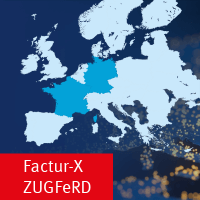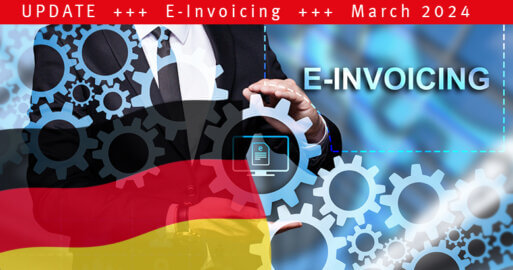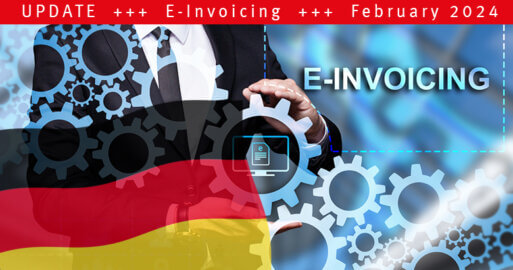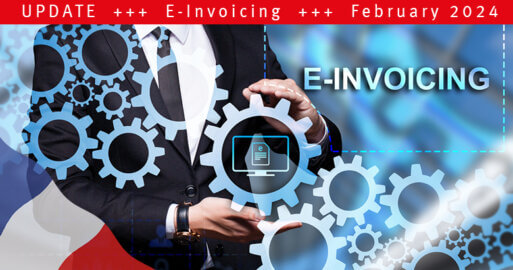Switzerland recommends using the German/French e-Invoicing standard
 Switzerland now officially recommends the use of a hybrid invoice format based on the German/French ZUGFeRD/Factur-X standard for E-Invoicing. The latter combines a l PDF/A-3 with XML data. The advantage: the recipient can read, print and archive the hybrid invoice format (the PDF part) manually as usual – or process the XML data automatically without any problems.
Switzerland now officially recommends the use of a hybrid invoice format based on the German/French ZUGFeRD/Factur-X standard for E-Invoicing. The latter combines a l PDF/A-3 with XML data. The advantage: the recipient can read, print and archive the hybrid invoice format (the PDF part) manually as usual – or process the XML data automatically without any problems.
Initial situation e-Invoicing Switzerland
Switzerland has a lot of experience with electronic invoicing (E-Invoicing), details of which can be found in our blog ‘State of E-Invoicing in Switzerland’. Until now, however, Switzerland has lacked an official standard for hybrid invoice formats.
Against this background, the GS1 Switzerland task force ‘Hybrid Invoice’ intensively pursued the definition and dissemination of such a standard in Switzerland. The participants of the task force itself consisted of representatives of different user industries and the financial administration. The objectives of the task force were:
- Definition of a hybrid invoice format based on PDF with embedded XML file,
- which is based on recognised standards of international organisations,
- is easy for users to implement
- and is supported as widely as possible.
Approach: The German/French standard ZUGFeRD/Factur-X as a model
In order to avoid reinventing the wheel, the task force took the German/French standard ZUGFeRD/Factur-X as model. On 7th January 2018, version 1.0 of this standard emanated from the cooperation between the German e-Invoicing Forum (FeRD) and the French Forum FNFE-MPE, which was established in 2014. Both countries are actively using it.
The ZUGFeRD/Factur-X standard is a hybrid electronic invoice format consisting of two components with identical content: a PDF file and an embedded XML file. The PDF is the human readable, visual representation of the invoice. A PDF/A-3 (ISO standard) is used, which is suitable for long-term storage so that the e-invoice is still readable at the end of the 10-year storage period. The XML file, on the other hand, contains the invoice data in structured form, is therefore machine-readable and can be processed automatically. The embedded XML file is based on international UN/CEFACT standards – an important prerequisite for the international compatibility of ZUGFeRD/Factur-X.
The German invoice standard ZUGFeRD 2.0 and the French invoice standard FACTUR-X are technically identical. In addition, the profile EN 16391 in ZUGFeRD and Factur-X corresponds to the European CEN standard 16931. This means that a complete, structured electronic invoice can be mapped with this profile.
Result and recommendation of GS1 Switzerland: Use of the format ZUGFeRD/Factur-X also in Switzerland
In summary, the GS1 Switzerland ‘Hybrid Invoice’ working group concluded that the German/French standard ZUGFeRD/Factur-X meets all the above criteria for a hybrid E-Invoicing format for Switzerland.
ZUGFeRD/Factur-X is:
- proven and tested in practice – ZUGFeRD has been in use across all industries since 2014
- EU-compliant according to EU directive for electronic invoices
- internationally compatible
- suitable for all sizes of companies
The task force of GS1 Switzerland therefore recommends the application of ZUGFeRD/Factur-X in Switzerland as well. In addition, GS1 is member of the ZUGFeRD- committees in order to incorporate Swiss needs into the standard and to keep European developments in line with the Swiss content standard.
Situation of E-invoicing in the B2G-sector in Switzerland
From 1st January 2016, invoices exceeding CHF 5,000 must be sent in electronic form. This limit is intended to accommodate small and medium-sized enterprises, which will continue to be allowed to issue paper invoices for small purchases (< CHF 5,000). Invoices can be sent to the Swiss Federal Administration as fully structured invoice data, as a PDF or can be entered directly in an online form.
Situation of E-Invoicing in the B2G sector in France
Chorus Pro was developed and is operated by the AIFE (Agence pour l’Informatique Financière de l’Etat respectively the French government’s financial information technology agency). In the future, all ~78,000 public administrations in France will exchange a total of approximately 100 million invoices per year via the Chorus platform.
The implementation obligation started in January 2017 with large companies and will end with the smallest in 2020, with the size of the companies being determined by various criteria such as the number of employees, turnover and balance sheet total:
- January 2017: ‘Large enterprises’
- January 2018: ‘Medium-sized enterprises’
- January 2019: ‘Small enterprises’
- January 2020: ‘all others including one-man companies’
AIFE has integrated Factur-X as an available hybrid format in Chorus Pro since May 2018.
Situation of E-Invoicing in the B2G sector in Germany
The E-Invoicing Act transposes the requirements of Directive 2014/55/EU of 16 April 2014 into national law. The E-Invoicing Act thus creates a binding legal basis for the receipt and processing of electronic invoices by federal public-sector customers. From 27 November 2018, the corresponding regulations will come into force for all federal ministries and constitutional bodies. In addition, the Federal Government can in future specify further detailed requirements for electronic invoicing, the invoice data model to be used and the binding nature of the electronic form by means of a statutory ordinance. The corresponding ordinance has also been published in the meantime.
Based on the recital of the EU Directive, the Federal Government is additionally introducing an E-Invoice obligation for suppliers as of November 27, 2020.
The recommendation can be found here.
With the new releases of ZUGFeRD 2.1 and Factur-X 1.0 the Forum for Electronic Invoicing Germany (FeRD) and the Forum National de la Facture Électronique et des Marchés Publics Électroniques (FNFE-MPE) published their new joint and EN 16931-compliant version of ZUGFeRD 2.1 and Factur-X 1.0. Details can be found in our blog „France and Germany publish their new version of common e-invoicing standard – ZUGFeRD 2.1 and Factur-X 1.0 released by FeRD and FNFE-MPE“.
SEEBURGER – Motor of digitalization and standardization
Through its active participation in UN/CEFACT, FeRD and the German/French workshops, SEEBURGER contributes significantly to the development of Factur-X and other international standards for the digitalisation of business processes.
For example, with ZUGFeRD 2.0, the invoice standard uses the latest version of the United Nations’ ‘Cross Industry Invoice’ (CII) syntax UN/CEFACT. According to the European standard, invoices in the CII syntax must be accepted by all public administrations. The CII itself in is turn based on the current technological data model ‘Supply Chain Reference Data Model’ (SCRDM) of the UN. In both topics (CII and SCRDM) SEEBURGER supports as an innovator and opinion leader in close cooperation with the Arbeitsgemeinschaft für wirtschaftliche Verwaltung e.V. and the German Federal Ministry of Economics and Energy.
SEEBURGER also offers a wide range of E-Invoicing solutions for business and government in Switzerland and more than 55 other countries. These solutions can be operated on-premises (in-house operation), as a cloud solution and of course as a hybrid solution. SEEBURGER offers a wide range of transfer options and in international and country-specific E-Invoicing formats – both incoming and outgoing. For example, SEEBURGER is also a Peppol access point operator. The SEEBURGER E-Invoicing solutions can be used independently of the ERP system. A particularly deep system integration was developed for the modules of our partner SAP (e.g. SD, IS-U, etc.).
Thank you for your message
We appreciate your interest in SEEBURGER
Get in contact with us:
Please enter details about your project in the message section so we can direct your inquiry to the right consultant.
Written by: Rolf Wessel
Rolf Wessel has been product manager at SEEBURGER for software applications and services for electronic business data exchange since 2010. His focus is on solutions for SAP, electronic invoicing (e-invoicing) and innovations for the digitalization of business and technical business processes. The Forum elektronische Rechnung Deutschland (FeRD) appointed Rolf Wessel as an expert. As project manager at the United Nations Centre for Trade Facilitation and Electronic Business (UN/CEFACT), he develops international trade facilitation and establishes standards for electronic business processes. Furthermore, he represents the German delegation of the FeRD at the Franco-German workshop with the Forum National de la Facture Electronique (FNFE) and thus supports the government initiative for international standardization and harmonization of e-invoicing processes. He is a member of the working committee "Electronic Business" at the German Institute for Standardization. (DIN) and Association for Electronic Invoicing (VeR). Rolf Wessel graduated in business informatics (FH) with a focus on financial management and production planning. After working in the electrical, financial, consumer goods, software and mineral oil industries, he had been a systems analyst and IT project manager in the retail and logistics sector from 2003 to 2010.






